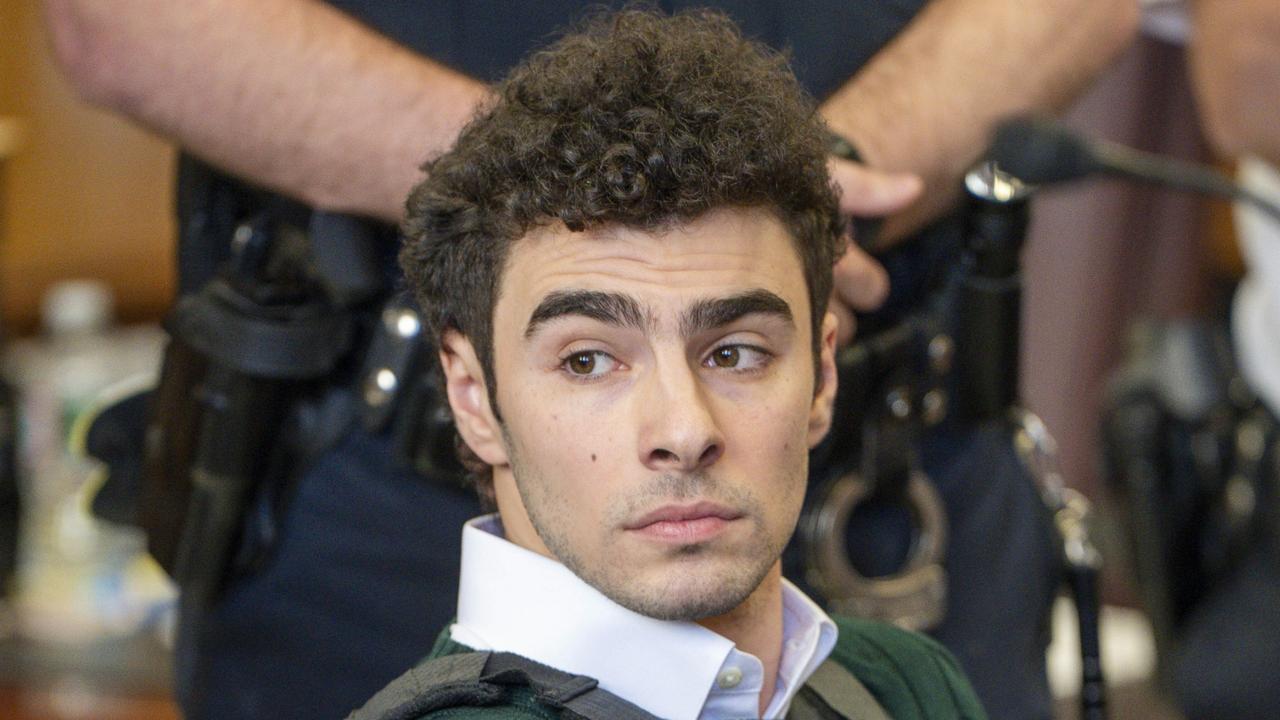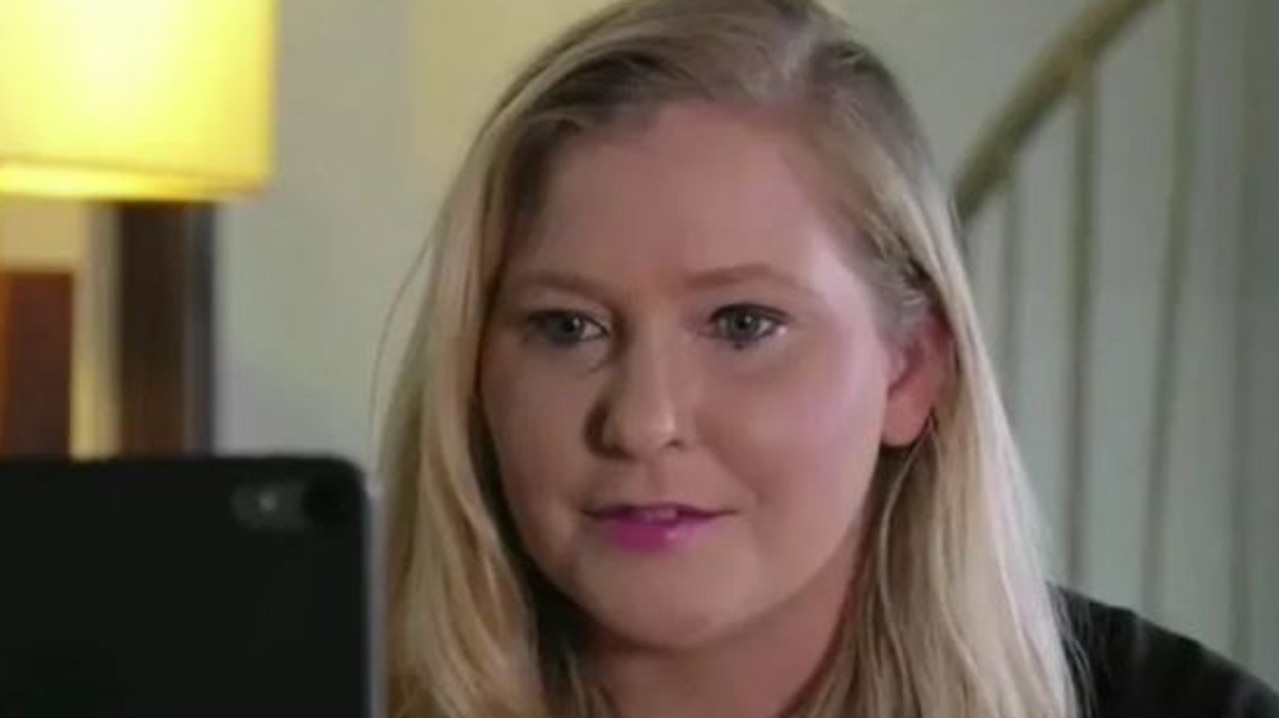Boris Johnson out as UK PM race down to final two
Boris Johnson gets terminated from UK parliament and leaves his final two replacement candidates to worry the outgoing Prime Minister will, ‘be back’.
World
Don't miss out on the headlines from World. Followed categories will be added to My News.
Boris Johnson hinted “I’ll be back” by signing off with a Terminator quote made famous by choosing a famous by Arnold Schwarzenegger.
To one last round of cheers from his recently mutinous MPs, UK Prime Minister Boris Johnson bowed out of his final setpiece event in parliament by saying: “Hasta la vista, baby!”
“Mission largely accomplished, for now,” he said, before departing to a standing ovation by nearly every Tory MP present.
The parting shot was taken as a hint he would be back, forcing his press secretary to issue denials he was already planning his political comeback.
“It was his way of saying farewell,” she said.
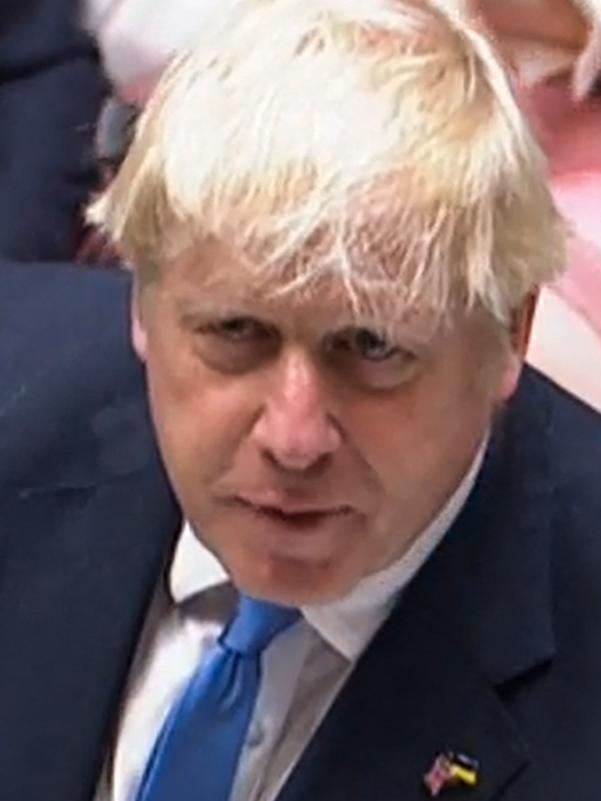

It came as the party selected Rishi Sunak and Liz Truss as the final two candidates to replace Johnson.
The Conservative rivals offer competing visions for Britain’s response to multiple crises, and will duel in the coming weeks ahead of the final ballot.
Former finance minister Sunak, running on a centrist platform of fiscal rectitude allied with “green levies” to fight climate change, again headed the field with 137 votes in the fifth and final elimination ballot.
The crucial race for second place was narrowly won by Foreign Secretary Liz Truss on 113 votes, against 105 for former Defence Secretary Penny Mordaunt.
Sunak and Truss now take their case to Conservative party members, who will decide the new leader and prime minister after a series of nationwide hustings in August.
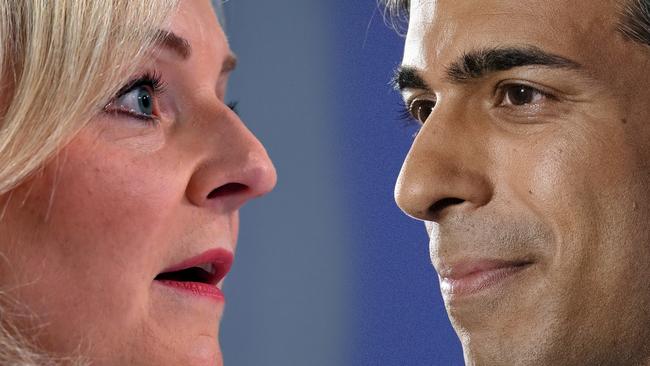
The result will be announced on September 5. But Britain is already guaranteed to get either its first prime minister of colour, or its third woman leader.
Sunak’s resignation as finance minister this month helped to topple outgoing leader Boris Johnson after months of scandal including “Partygate”, and Downing Street is reportedly running an “anyone but Rishi” campaign.
At his last session of Prime Minister’s Questions in the House of Commons earlier Wednesday, Johnson bowed out by saying “Hasta la vista, baby!”.
In a hint of support for Truss’s low-tax platform, the Johnson used his last session of Prime Minister’s Questions in the House of Common to urge his successor to “cut taxes and deregulate where you can to make this the greatest place to live and invest”.
Largest difference between the two finalists is taxes, with Truss vowing to cut them and Sunak countering they need to be raised.
Truss tweeted that she was “ready to hit the ground running from day one”.
But whoever wins the Tory race, “like some household detergent, would wipe the floor” with the main opposition Labour party, Johnson predicted.
RACE FAVOURITE KICKED OUT
Conservative MPs blocked the party’s favoured candidate for Prime Minister from going into the next round of voting by eliminating Kemi Badenoch.
Badenoch, the former equalities minister, topped a recent poll of the Tory party members who will select who will replace Boris Johnson.
But they have been denied the choice to vote for her after MPs threw their support behind established party fixtures, with former finance minister Rishi Sunak topping the final three contenders.
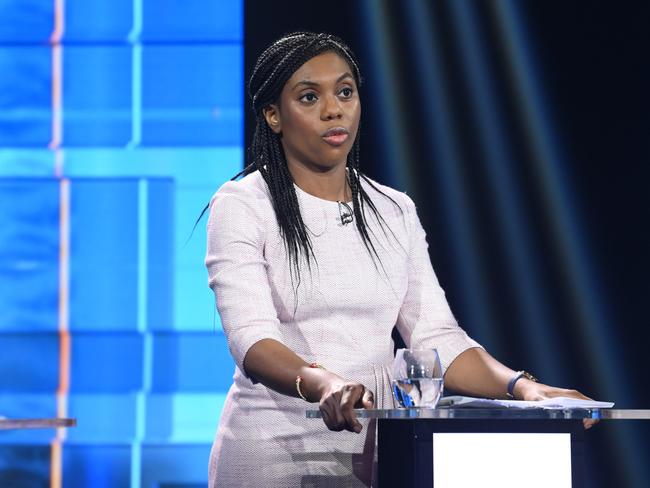
Former defence minister Penny Mordaunt came second on 92 votes, and Foreign Secretary Liz Truss scrapped in with 86 votes.
Ms Badenoch, a relative unknown at the start of the race, was eliminated on 59 votes despite beating the rest of the party among the 180,000 members who will have the final say on who occupies No. 10 Downing Street.
A YouGov poll on showed Badenoch beat each candidate in a head-to-head run-off if she would have made the final two, showing the gap between the party’s leadership and its grassroots members.
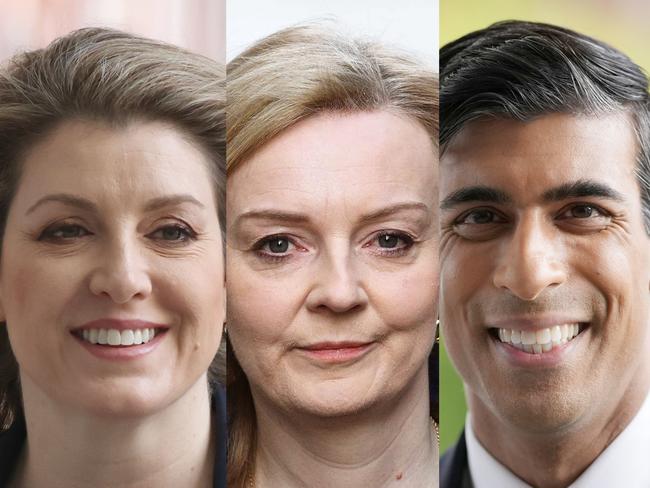
While favourite Sunak is two votes short of the 120 needed to guarantee making the final two, polling shows him losing against all challengers among Tory party members.
His challenger will likely to be decided by supporters of upstart Badenoch and who they choose to back following her elimination. The last round of voting by MPs will take place Wednesday local time.
MAJOR CHANGE IN UK PM RACE
Four contenders to become the next Prime Minister of the UK remain after the elimination of Tom Tugendhat in the latest round of voting.
Among those still in the running is relative unknown Kemi Badenoch, the former junior minister that has out performed more senior challengers to make it to the next round.
At 58 votes, Badenoch is behind her nearest rival Liz Trus, on 71. Second in the race is Penny Mordaunt, on 81 votes, and leading is Rishi Sunak on 115 votes, just five short of a guaranteed place in the final two.
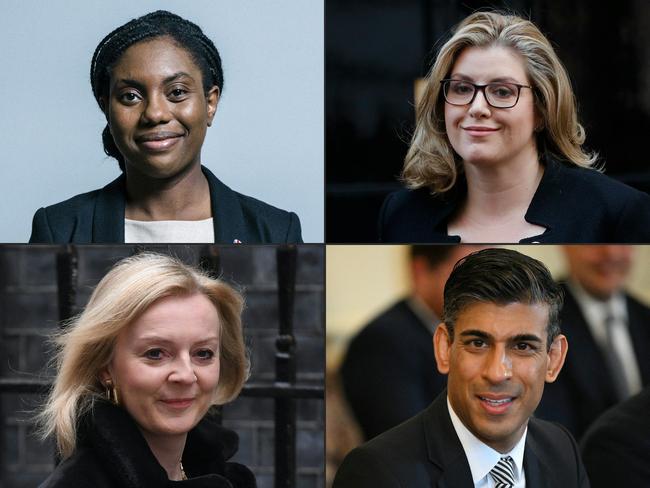
The 31 MPs that voted for Tugendhat, Chairman of the Foreign Affairs Committee, will now shift their votes to the remaining candidates in the next round.
Sunak picked up the most new votes in the latest round with and additional 15, followed by Badenoch with nine new votes. Truss went up by seven while Mordaunt went backwards with one lost vote.
While Sunak widened his lead as favourite, the race between Badenoch and Truss at the bottom of the ballot could decide his challenger. The two are more similarly aligned to the right of the party’s politics compared to the left-leaning Mordaunt. There are calls for either Badenoch or Truss to drop out and support the other to ensure a Conservative makes it to the final two.
The whittling down to four comes after TV bosses were forced to scrap the next planned debate when two of the top contenders, former finance minister Sunak and Foreign Secretary Truss pulled out.
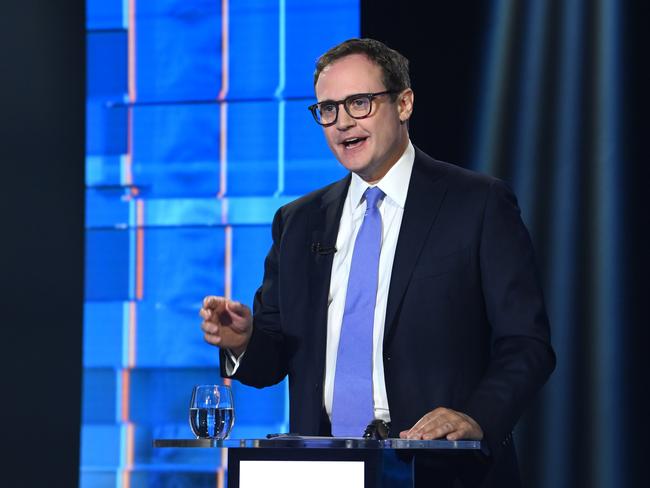
The remaining candidates were due to appear in the third televised debate on Sky News, but it was cancelled following the withdrawal of
“Conservative MPs are said to be concerned about the damage the debates are doing to the image of the Conservative party, exposing disagreements and splits within the party,” Sky News said in a statement.
In the two previous televised debates over the weekend, the contenders clashed on whether to cut taxes to help ease a soaring cost of living crisis.
Paul Goodman, from the ConservativeHome website, likened the debates to a “political version of The Hunger Games as the debates turned ugly and personal, with candidates encouraged to directly criticise one another and their proposals.
“Tory MPs and activists will have watched in horror as several of the candidates flung buckets of manure over each other,” he wrote.
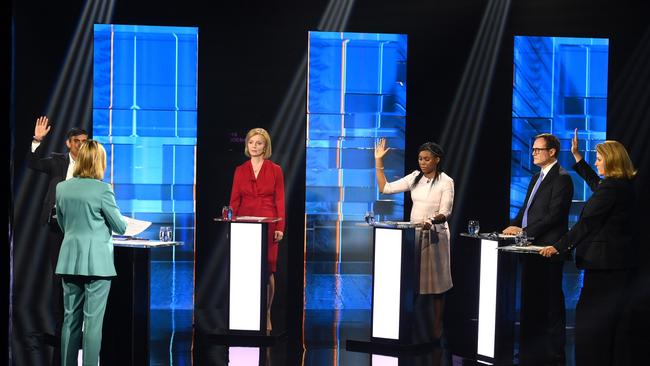
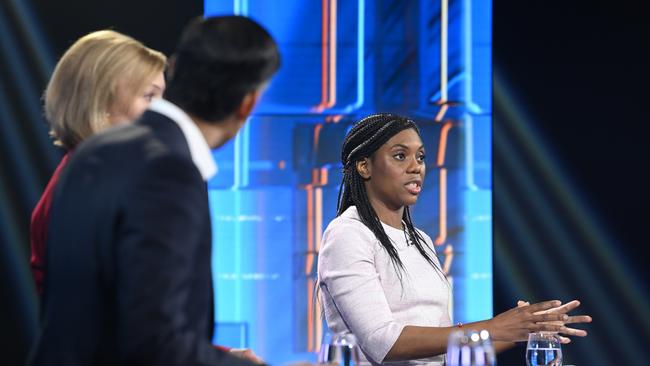
Sunak called out Truss for voting against Brexit, her previous membership of the Liberal Democrats, and her position on tax.
In turn, Truss questioned Sunak’s stewardship of the economy. Badenoch attacked Mordaunt for her stance on transgender rights -- a rallying call in the “culture wars” exercising the Tory right.
TOP ELIMINATION A MAJOR BREXIT SETBACK
The Conservatives’ contest to elect a new leader and British prime minister has been whittled down to five contenders after Suella Braverman was eliminated in the second round of voting.
Braverman, the Attorney General, was the strongest supporter of Brexit and had vowed to deliver on “all of the great opportunities” of leaving the European Union, including a “firm line” on migration and suspending “the all-consuming desire to achieve net zero by 2050”.
While former finance minister Rishi Sunak is leading the way with his MP colleagues, second-placed Penny Mordaunt is polling out front with party members, who will ultimately decide the winner.
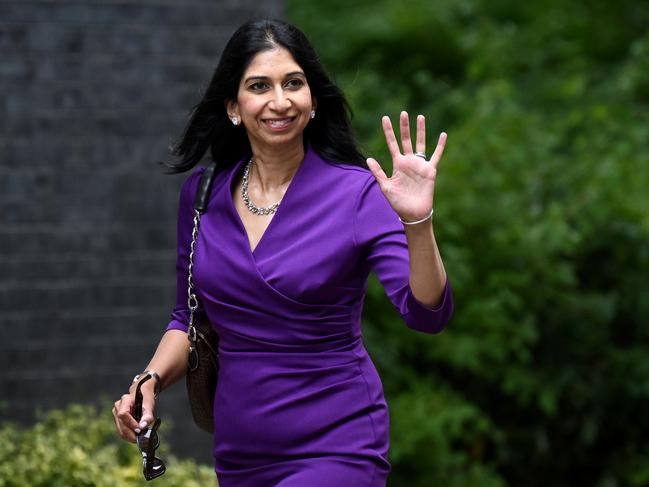
The Royal Navy reservist again came a strong second with 83 votes, behind former finance minister Sunak with 101.
Foreign Secretary Liz Truss -- the favoured candidate of Johnson loyalists -- was third with 64, after formally launching her campaign with vows of tax cuts and a smaller state.
Former equalities minister Kemi Badenoch, who resigned last week, has been the surprise package of the campaign, rising from relative obscurity to see off high-profile candidates.
Tom Tugendhat, the prominent backbencher who chairs parliament’s influential foreign affairs committee, rounds out the final five.
Several further ballots of Tory lawmakers will be held next week, with the last-placed candidate and any others receiving fewer than 30 votes eliminated each time.
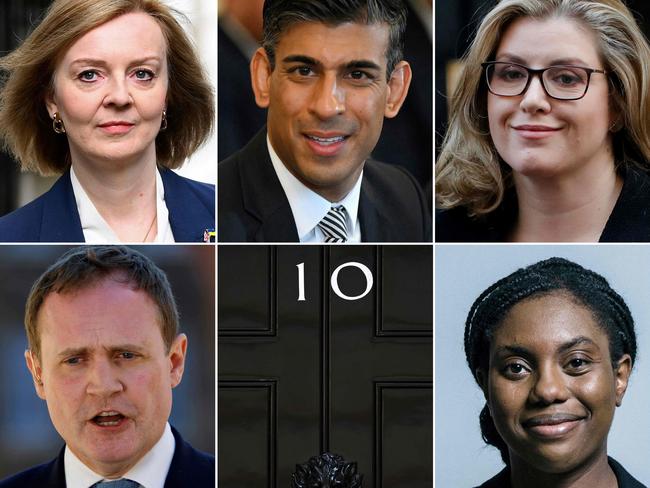
How the race will unfold:
Friday, July 15 - Contenders are set to take part in the first televised debate of the contest broadcast on Channel 4.
Sunday, July 17 - A second scheduled TV debate will reportedly take place on ITV
Monday, July 18 - A third TV debate is planned for broadcast on Sky News followed by the next round of voting.
Tuesday, July 19 - If needed, a fourth round of voting will occur
Wednesday, July 20 - If still needed, a fifth and final ballot of Conservative MPs will be held. The two leading candidates embark of a summer of nationwide campaigning
Monday, September 5 - The result of the vote by party members will be announced, with the winner immediately becoming its new leader.
Tuesday, September 6 - The newly crowned leader will replace Boris Johnson after visiting Queen Elizabeth II at Buckingham Palace and forming a new government.
BORIS SHOCKS WITH SURPRISE COUNTER VOTE
Boris Johnson out-manoeuvred his rivals again by blocking a ‘no-confidence’ vote in his government only to schedule a ‘confidence’ vote in its place.
The surprise move came as the number of candidates to replace him as Prime Minister was cut from eight to six after the first round of voting, with finance minister Nadhim Zahawi and former foreign minister Jeremy Hunt eliminated from the race.
Two Scottish MPs, meanwhile, were thrown out of the Commons for protesting the UK Government’s refusal to allow a second Scottish independence vote.
The protest began a wild day in parliament in which the government blocked the Labour opposition’s second attempt to bring a no-confidence vote on Wednesday local time, with a spokesperson saying a vote of confidence would instead be held next week.
MPs are now set to vote on Monday whether they should continue in its current form, catching Westminster off-guard and potentially blocking attempts at triggering an election.
“Labour were given the option to table a straightforward vote of no confidence in the Government in keeping with convention, however, they chose not to,” a spokesperson said.
“To remedy this, we are tabling a motion which gives the House the opportunity to decide if it has confidence in the Government.”
The manoeuvre, if successful, likely takes a snap election off the table and allows the party leadership race to continue until the September 5 deadline.
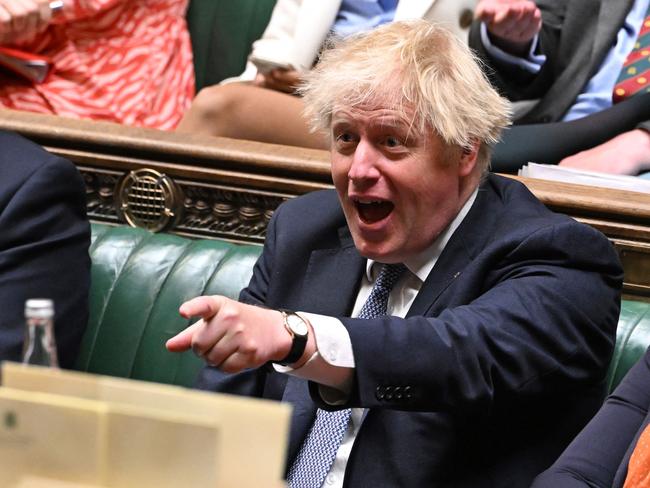
Rishi Sunak, who quit as finance minister last week to trigger Johnson’s downfall, leads the pack with the support of 88 Tory MPs, followed by Penny Mordaunt, on 67, who polling shows is most popular with the party membership that will ultimately decide the race
Former finance minister Rishi Sunak led the field of Conservative MPs bidding to become Britain’s next prime minister in the first ballot of Tory lawmakers Wednesday, as the race narrowed to six with the elimination of two candidates.
Early frontrunner Sunak, who quit as finance minister last week to help trigger outgoing Prime Minister Boris Johnson’s downfall, topped the contest with 88 votes, followed by former defence minister Penny Mordaunt, on 67.
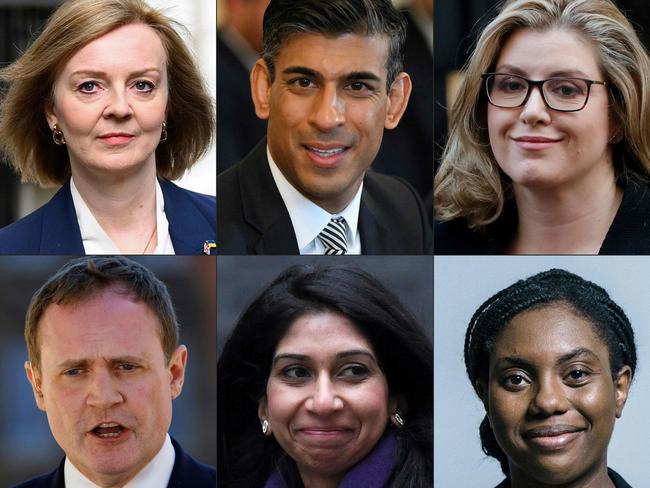
Foreign Secretary Liz Truss finished third with 50 Conservative lawmakers’ support.
The remaining candidates to meet the minimum 30-vote threshold were former equalities minister Kemi Badenoch, on 40, backbencher Tom Tugendhat, on 37, and Attorney General Suella Braverman, who scraped through with 32 votes.
There will be no let-up to the contest, with another round of voting set for Thursday, as the ruling party tries to winnow the candidates list down to a final pair over the next week to then put to party members.
The battle has already been marked by infighting between the candidates, prompting the beaten Hunt to warn the remaining rivals that “smears & attacks may bring short term tactical gain but always backfire long term”.
BORIS ‘BLOCKS’ BID TO FORCE HIM OUT
Boris Johnson’s government has been accused of ripping up the rule book to prevent the outgoing Prime Minister from being hauled out of No 10 Downing Street immediately.
It comes as the field of challengers has been whittled down to the eight top contenders, who will now face a series of run-off votes before a leader is chosen by the September 5 deadline.
Sir Graham Brady, the chair of the 1922 Committee, announced the candidates on tomorrow’s first leadership ballot include Kemi Badenoch, Suella Braverman, Jeremy Hunt, Penny Mordaunt, Rishi Sunak, Liz Truss, Tom Tugendhat and Nadhim Zahawi.
Those failing to get 30 votes in the next round will then be eliminated, with a series of votes held into next week until there are just two left in the race. Grassroots party members will then be balloted to vote on the final two.
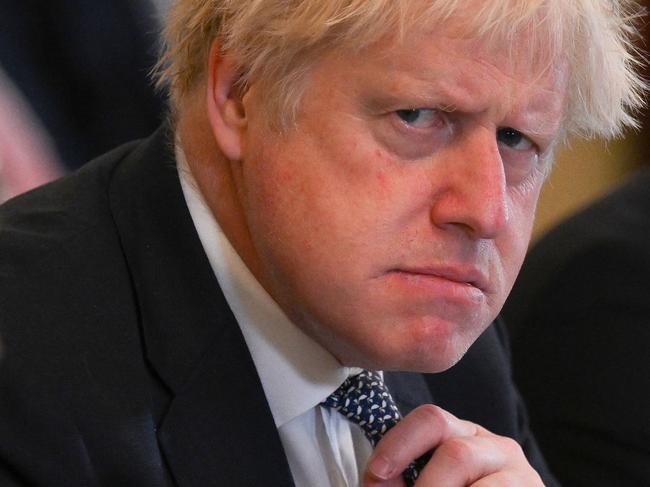
The opposition Labour Party, meanwhile, said Johnson’s “unprecedented” move to reject a motion for a vote of no confidence showed the Tories were “running scared”.
Opposition leader Sir Kier Starmer confirmed he would table a motion for the vote of no confidence in the government on Wednesday local time, a move that could trigger a general election and eject Johnson from office before his “caretaker” status ends when a new leader is chosen.
“They can’t now let him cling on for weeks and weeks and weeks until September 5,” Starmer argued. “It would be intolerable for the country.”
The no-confidence motion is expected to be voted on by the House of Commons on Wednesday local time after the government refused time to debate.
“This is totally unprecedented. Yet again the Tories are changing the rules to protect their own dodgy mates,” a Labour spokesperson said in a statement to ITV News, which reports the vote was rejected as the motion broke with convention.
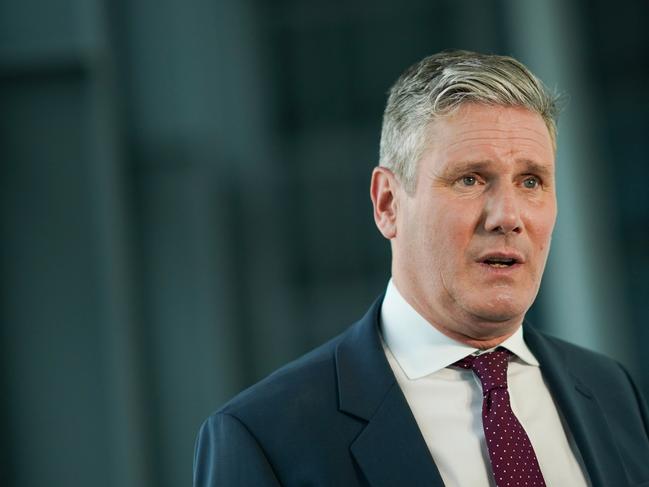
It came as former finance minister Rishi Sunak, the frontrunner among potential successors,
said his campaign to be Britain’s next prime minister would avoid any attempt to “demonise” Johnson, despite having helped trigger his dramatic downfall.
He called Johnson “one of the most remarkable people I’ve met”. “Whatever some commentators may say, he has a good heart,” he told cheering supporters, after one Johnson ally accused Sunak of being a treacherous “snake”.
“But did I disagree with him? Frequently. Is he flawed? Yes, and so are the rest of us. Was it no longer working? Yes, and that’s why I resigned.
“But let me be clear, I will have no part in a rewriting of history that seeks to demonise Boris, exaggerate his faults or deny his efforts.”
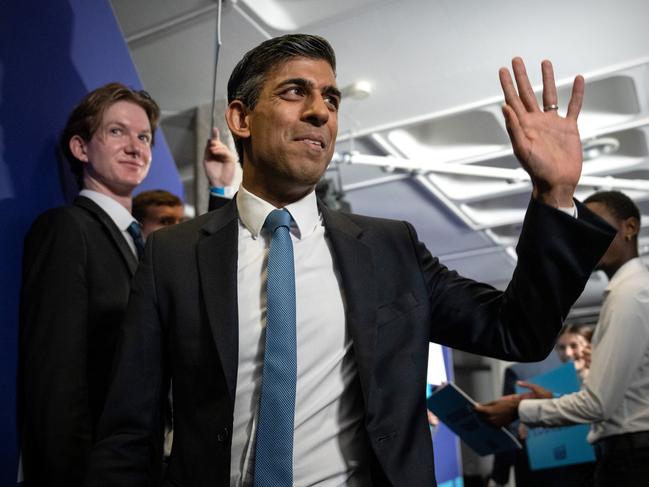
BORIS SPEAKS OUT
Boris Johnson on Monday refused to give his backing to any candidate vying to replace him as British prime minister, in his first public appearance since being forced to quit.
The 58-year-old leader dramatically announced his departure as Conservative party leader last Thursday, but is staying on in Downing Street until a replacement is found.
So far, 11 hopefuls have declared their intention to stand in the internal leadership contest, with the party expected to outline a timetable later on Monday.
On a visit to a science research institute in London, Johnson was asked directly if he would endorse a successor.
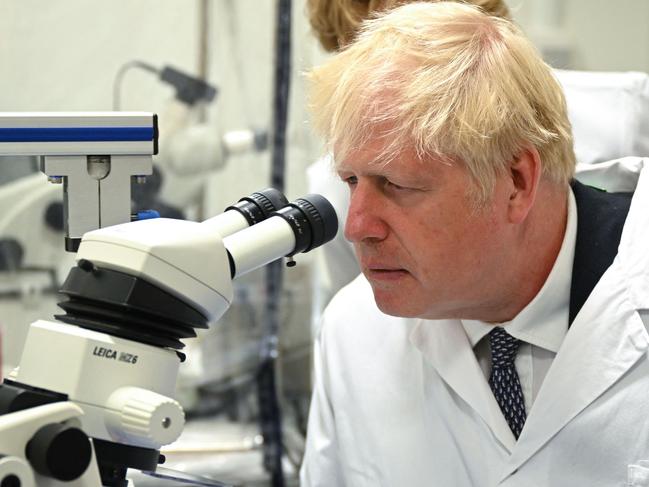
“The job of the prime minister at this stage is to let the party decide, let them get on with it, and to continue delivering on the projects that we were elected to deliver.”
Johnson’s fall from grace has been spectacular. In December 2019 he won a landslide 80-seat victory on a promise to take Britain out of the European Union.
His parliamentary majority allowed him to do just that but his premiership was hit by waves of scandal: lockdown-breaking parties in Downing Street that saw him fined by police; and his appointment of a senior colleague despite knowing of sexual assault allegations against him.
In his resignation speech, he blamed the “herd” for moving against him, and his allies have been briefing angrily against former chancellor of the exchequer Rishi Sunak.
But Johnson refused to say Monday whether he felt betrayed.
“I don’t want to say any more about all that,” he said.
“There’s a contest under way and that has happened and you know, I wouldn’t want to damage any chances by offering my support.
“I just have to get on and in the last few days or weeks … the constitutional function of the prime minister in this situation is to continue to discharge the mandate. And that’s what I’m doing,” he added.
WOULD-BE SUCCESSOR’S CAMPAIGN MOVE
Ex-Chancellor Rishi Sunak launched a bid for the Tory leadership with a slick campaign video in the wake of Johnson’s resignation.
Sunak resigned his role as Chancellor of the Exchequer late Tuesday, prompting dozens of more junior colleagues to follow suit in the subsequent 36 hours and forcing his ex-boss to then quit as leader of the ruling Conservatives on Thursday.
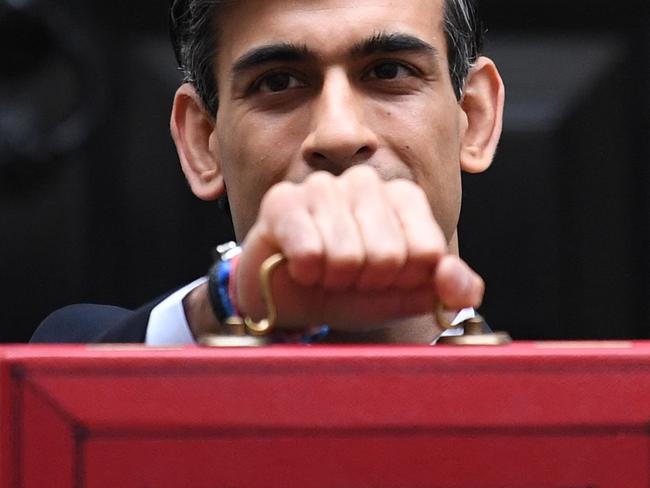
Unveiling his leadership credentials in a slick video on social media ahead of what could be a months-long campaign involving more than a dozen Tory MPs, Sunak vowed to rebuild trust between Britons and their government.
“Let’s restore trust, rebuild the economy and reunite the country,” the multi-millionaire added.
The Labour Party is set to trigger a no-confidence vote in parliament if Boris Johnson is not removed from office in a bid force the embattled Prime Minister out of Downing Street immediately.
I’m standing to be the next leader of the Conservative Party and your Prime Minister.
— Ready For Rishi (@RishiSunak) July 8, 2022
Let’s restore trust, rebuild the economy and reunite the country. #Ready4Rishi
Sign up 👉 https://t.co/KKucZTV7N1pic.twitter.com/LldqjLRSgF
Labour’s deputy leader Angela Rayn said if the Tories don’t drag Johnson out of No 10, they would.
“He’s a proven liar who’s engulfed in sleaze and we can’t have another couple of months of this,” she told BBC radio.
“If they don’t, we will call a no-confidence vote because it’s pretty clear he hasn’t got the confidence of the House (of Commons) or the British public.”
A timetable for the leadership contest is expected on Monday, with the winner installed in time for the party’s annual conference in early October.
Sunak joins Conservative MP Tom Tugendhat and Attorney-General Suella Braverman, who have also both officially announced their candidatures.
Former health and foreign secretary Jeremy Hunt, who lost to Johnson in 2019, was “virtually certain” to run again, a source close to Hunt told British media.
Defence Minister Ben Wallace, who is also expected to declare, and Sunak are among the early frontrunners, according to a YouGov poll of Tory members.
“Let’s restore trust, rebuild the economy and reunite the country,” said Sunak in a campaign launch video.
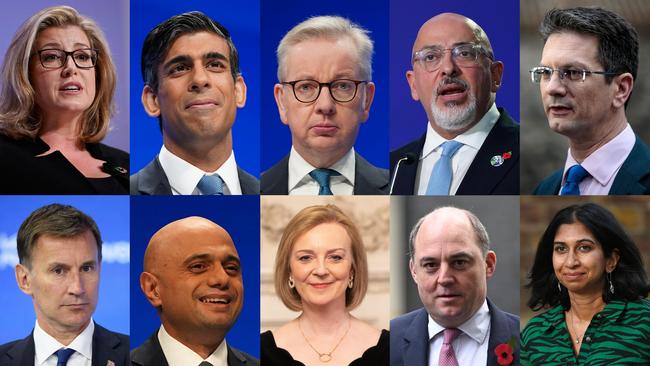
Johnson’s spokesman said there was no question of deputy prime minister Dominic Raab taking over as caretaker.
“The prime minister is acting in line with convention. He remains prime minister until a new party leader is in place and the work of the government will continue while that takes place,” he told reporters.
For Labour to trigger a no-confidence vote, they would need dozens of Conservative MPs to cross the aisle and join their rivals. But the strategy is fraught as it could trigger a general election, and the danger of Tory MPs losing their seats, if Johnson is defeated.
JOHNSON CLINGS ON AS ‘CARETAKER’
During his stunning resignation speech, Mr Johnson said he’d remain as caretaker Prime Minister until his successor had been appointed.
The UK political process means a new leader is likely to be elected by October, however former Prime Minister Sir John Major said it was “unwise and may be unsustainable” for Mr Johnson to hold on until then.
Labour leader, Keir Starmer, said his party would table a motion of no confidence in the government in the House of Commons if Mr Johnson didn’t immediately step aside.
“He needs to go; he can’t cling on in this way. His own party have now decided that he’s unfit to be prime minister. They can’t now inflict him on the country for the next few months,” he said.
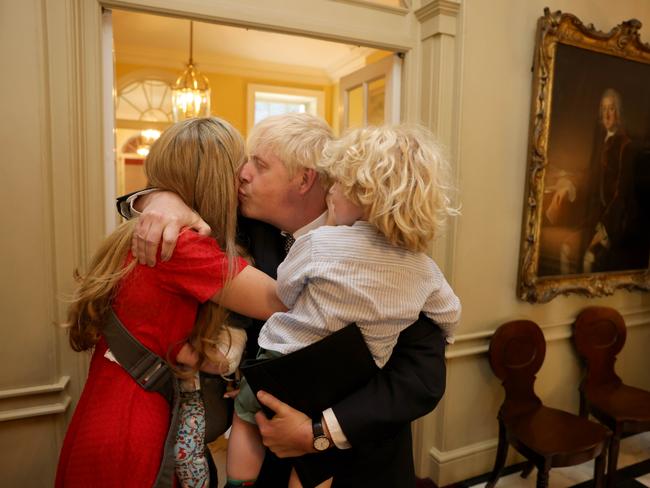
Mr Tugendhat, who is the chairman of parliament's foreign affairs committee, announced his intention to run for conservative leadership via an article in The Daily Telegraph, writing it was “time for renewal”.
“I have served before – in the military, and now in parliament,” he wrote.
“Now I hope to answer the call once again as prime minister. It’s time for a clean start. It’s time for renewal.”
Prior to Mr Johnson’s resignation, Attorney-General Suella Braverman indicated her intention to throw her hat into the ring. Ardent Brexiteer Steve Baker and Business Secretary Kwasi Kwarteng have also implied their intention to run.
“We now need a new leader as soon as practicable,” Mr Kwarteng said.
“Someone who can rebuild trust, heal the country, and set out a new, sensible and consistent economic approach to help families,” he said.
BORIS JOHNSON RESIGNS
Boris Johnson has resigned as Britain’s Prime Minister, clearing the stage for a new Tory leader by October.
In an address outside Downing Street, Mr Johnson said it had been an “immense privilege” to serve as Britain’s prime minister, but conceded that “no one is remotely indispensable”.
“It is clear now the will of the parliamentary Conservative Party, that there should be a new leader of that party and therefore a new prime minister,” he said.
“I know there will be many people who will be relieved and perhaps quite a few who will be disappointed, and I want you to know how sad I am to be giving up the best job in the world,” he said. “But them’s the breaks.”
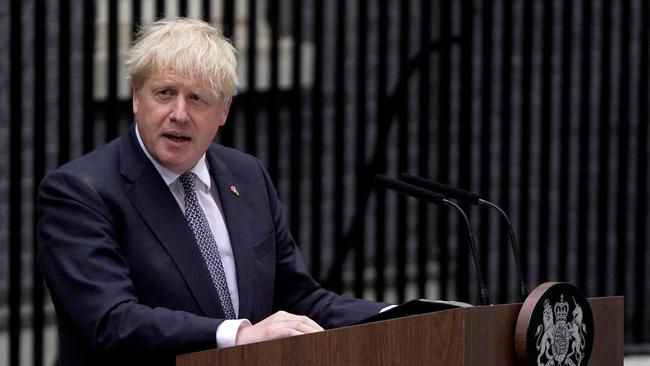
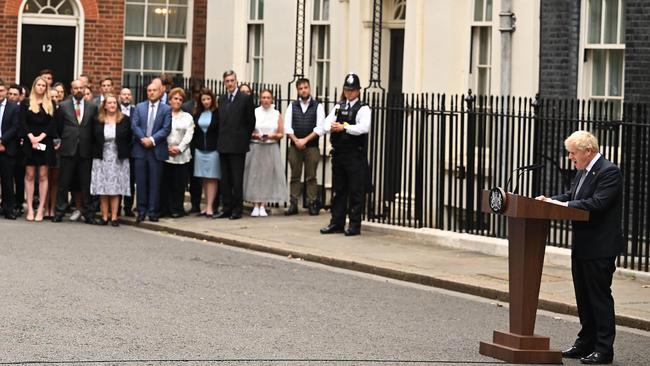
Mr Johnson offered his thanks to the millions of people who voted Conservative in 2019, some of them for the first time.
“Thank you for that incredible mandate,” he said.
He said it was because of this mandate he “fought so hard” in the last few days to deliver the voters’ will in person, arguing it would be “eccentric” for the party to change leaders.
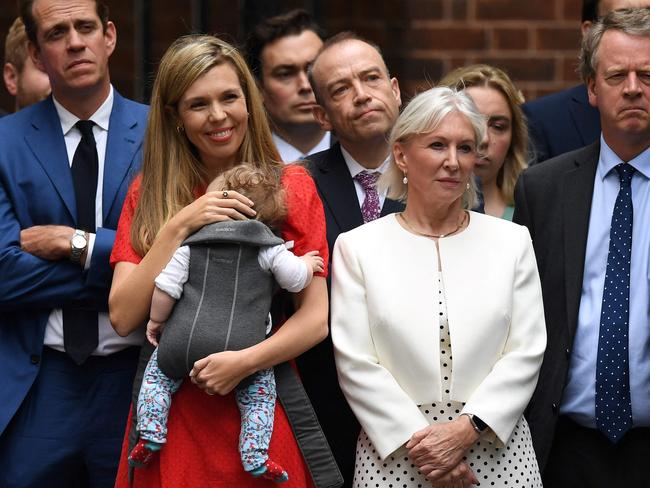
“I regret not to have been successful in those arguments and of course it’s painful,” he said.
“In Westminster, the herd instinct is powerful and when it moves, it moves,” he said.
Carrie Johnson held their daughter Romy as she gathered in Downing St with the Mr Johnson’s loyalists.
He said he was “immensely proud of the achievements of this government” such as Brexit and the vaccine rollout.
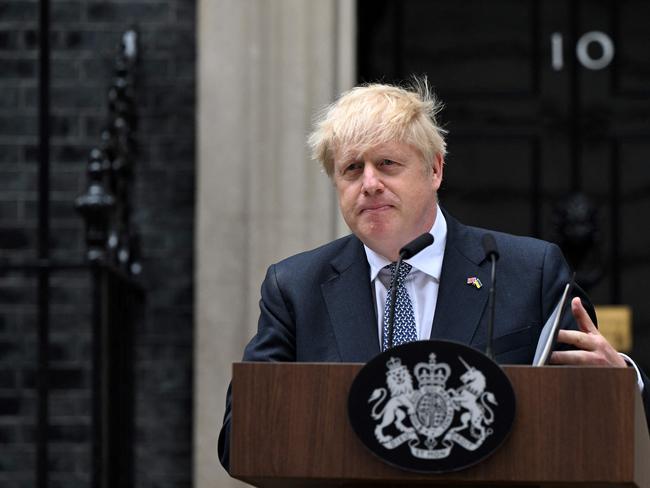
Mr Johnson spoke about the “painful” decision to stand down but said the embattled party must unite.
He said he would line up a “unity Cabinet” as he battles to stay in office for a few months longer.
“The process of choosing that new leader should begin now. And today I have appointed a cabinet to serve, as I will until a new leader is in place,” Mr Johnson said.
The British leader admitted defeat 30 minutes after an intervention from finance Minister Nadhim Zahawi, who was only appointed on Tuesday night in the wake of the departure of predecessor Rishi Sunak.
Mr Zahawi told Mr Johnson that his situation was “not sustainable”.
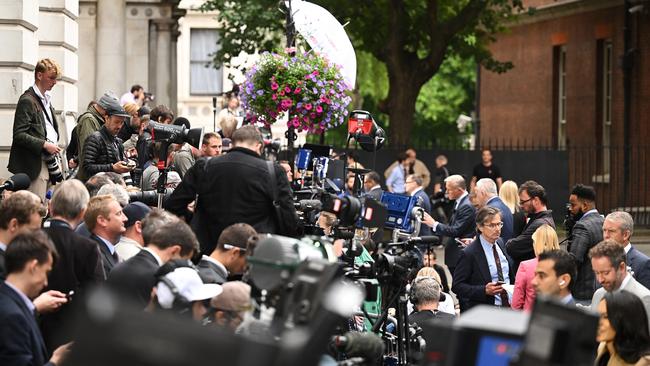
Mr Johnson had earlier called the Queen to inform her of his intention to stand down.
Mr Johnson may stay on as caretaker Prime Minister until a new successor is picked by Tories at a party conference in October, the BBC and others reported.
Mr Johnson‘s premiership has been marred by a series of scandals since his 2019 landslide victory.
His latest woes erupted last Thursday over former deputy chief whip Chris Pincher, who resigned amid allegations he groped two male guests at a private dinner the previous evening.
Opposition Labour leader Keir Starmer welcomed his impending departure. But Starmer said what was needed was “a proper change of government” and demanded a no-confidence vote in parliament, rather than Johnson “clinging on for months and months to come”.
The Conservatives have overseen 12 years of economic stagnation, declining public services and empty promises.
— Keir Starmer (@Keir_Starmer) July 7, 2022
We don’t need to change the Tory at the top – we need a proper change of government.
We need a fresh start for Britain. pic.twitter.com/uMxRTomXX9
Even while eyeing the exit, Mr Johnson on Thursday sought to steady the ship with several appointments to replace the departed cabinet members. They included Greg Clark, an arch “remainer” opposed to Brexit.
Mr Johnson had been clinging on to power despite a wave of more than 50 government resignations, expressing defiance late Wednesday.
But Thursday’s departure of education Minister Michelle Donelan and a plea to quit from finance Minister Nadhim Zahawi, only in their jobs for two days, appeared to tip the balance.
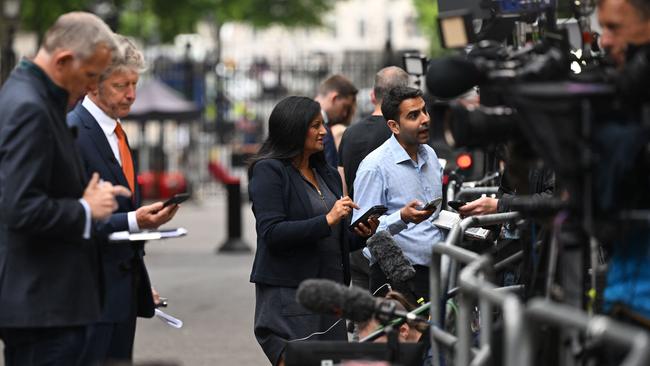
PREVIOUS OUSTED CONSERVATIVE LEADERS
Mr Johnson is the latest Conservative leader to feel his party’s wrath following a string of resignations from his scandal-plagued government.
Here are three leaders previously ousted by their fellow Tories:
Margaret Thatcher
Britain’s longest-serving prime minister of the 20th century tearfully stepped down in November 1990 after a cabinet revolt.
She had vowed to fight on after narrowly winning the first round of a leadership ballot, but then accepted that her position had become untenable.
Although she had won a third term by a landslide in 1987, her introduction of a universal “poll tax” payable by every adult regardless of income was met with violent opposition.
She also faced deep opposition within her cabinet for staunchly fighting having closer ties with Europe.
Her once close ally Geoffrey Howe resigned from the cabinet and launched a scathing attack on her Europe policy in parliament.
That precipitated the leadership challenge by former defence and environment Minister Michael Heseltine, before John Major emerged as the new prime minister in a vote among Tory MPs.
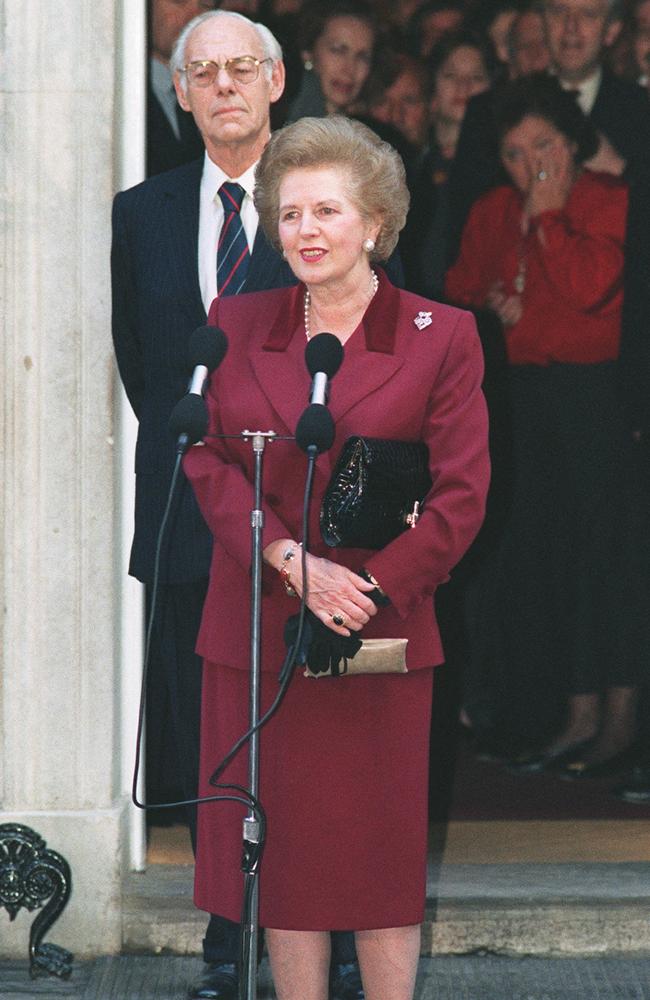
Iain Duncan Smith
Duncan Smith, one of a cabal of right-wing Eurosceptics dubbed “bastards” by Major, won the Conservative leadership in 2001, replacing William Hague after the party suffered another election defeat to Labour.
His surprise ascent was helped by Thatcher and her loyalists in parliament. But the self-styled “quiet man” of UK politics struggled to hold his own against Labour’s charismatic prime minister, Tony Blair.
By October 2003, the parliamentary party was despairing of Duncan Smith’s inability to make any headway against Blair, despite huge public opposition to Britain’s involvement in the war in Iraq.
He lost a confidence vote, becoming the first Tory leader not to fight a general election since Neville Chamberlain, who was accused of appeasing Adolf Hitler in the late 1930s.
Theresa May
Former interior Minister Theresa May came to power in July 2016 after Britain’s shock referendum vote to leave the European Union, which prompted then prime minister David Cameron to resign.
She immediately found herself in charge of negotiating Britain’s exit terms, but her attempts to negotiate a “soft” Brexit were shot down by hard line Brexiteers within the Conservative party.
May called a snap general election in June 2017 in the hope of strengthening her position against the Brexit rebels and Labour.
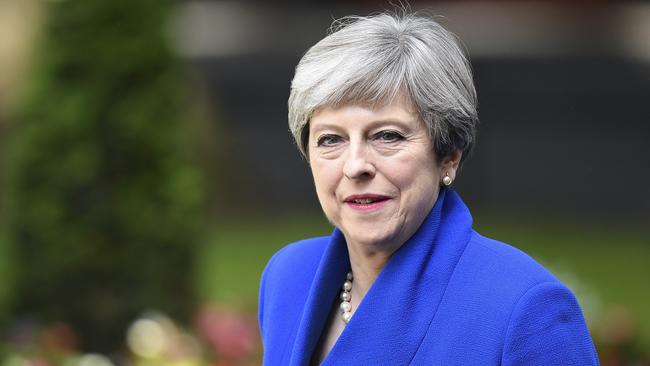
It proved a disastrous bet, with Labour under its far-left leader Jeremy Corbyn making strong inroads and forcing her to turn to hard line, pro-UK unionists in Northern Ireland for parliamentary backing.
She survived a confidence vote called by Conservative rebels in December 2018. But after her Brexit deal was rejected in the House of Commons for a fourth time, including by dozens of Conservative rebels, her leadership was mortally weakened.
She announced in May 2019 that she was stepping down, triggering the leadership race that brought Johnson to power two months later.
MASS EXODUS OF BRITISH MPS
More than 50 MPs resigned from government since Tuesday.
MP James Davies was one the latest MPs to quit, abandoning his role as parliamentary private secretary at the Department of Health.
He tweeted: “Earlier today, I advised the whips of my intention, with great regret, to resign as PPS. I said this would follow the completion of my PPS commitments in the Chamber this evening for Minister of State for Health, Ed Argar MP. I have done so, alongside him.”
MP Gareth Davies also announced his resignation as parliamentary private secretary at the Department of Health via Twitter, writing: “It is with great regret that I have informed the whips office of my resignation as a PPS at the Department of Health and Social Care. It has been a privilege to serve in the role and not a decision I have taken lightly.”
Health Minister Edward Argar and Wales Secretary Simon Hart have also resigned.
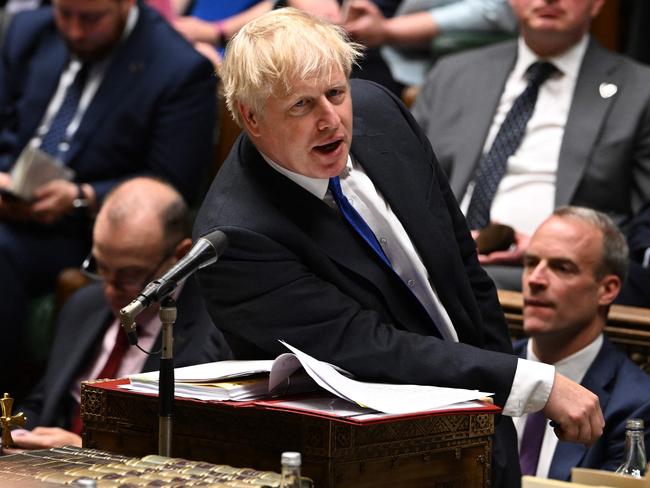
“I fear that a change is needed in order for our party to continue on our shared ambitions for our country,” Mr Argar wrote in his resignation letter.
Earlier, Mr Johnson sacked Levelling Up Secretary Michael Gove, after it was revealed the once-loyal secretary had joined the chorus of MPs to urge the PM to step down, triggering a further three resignations.
Danny Kruger, a parliamentary private secretary for the Levelling Up department, resigned just minutes after Mr Gove was sacked.
He said it “should be the PM leaving office”, and not Mr Gove.
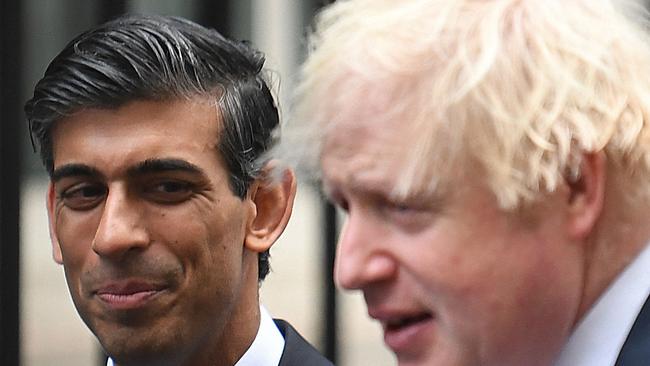
Mr Kruger recently courted controversy himself when he claimed women should not have complete autonomy over their bodies during a discussion about abortion.
James Daly, a ministerial aide at the Department of Work and Pensions, and UK trade envoy to New Zealand, David Mundell have also resigned, brining the total number of resignations to 42.
Mr Mundell said he was “very disappointed” Mr Johnson had not listened to the advice of colleagues to stand down.
He said he sent a letter of no confidence in the PM to the 1922 Committee earlier this week and asked for another vote to take place “as a matter of urgency”.
- Additional reporting by AFP
More Coverage
Originally published as Boris Johnson out as UK PM race down to final two



